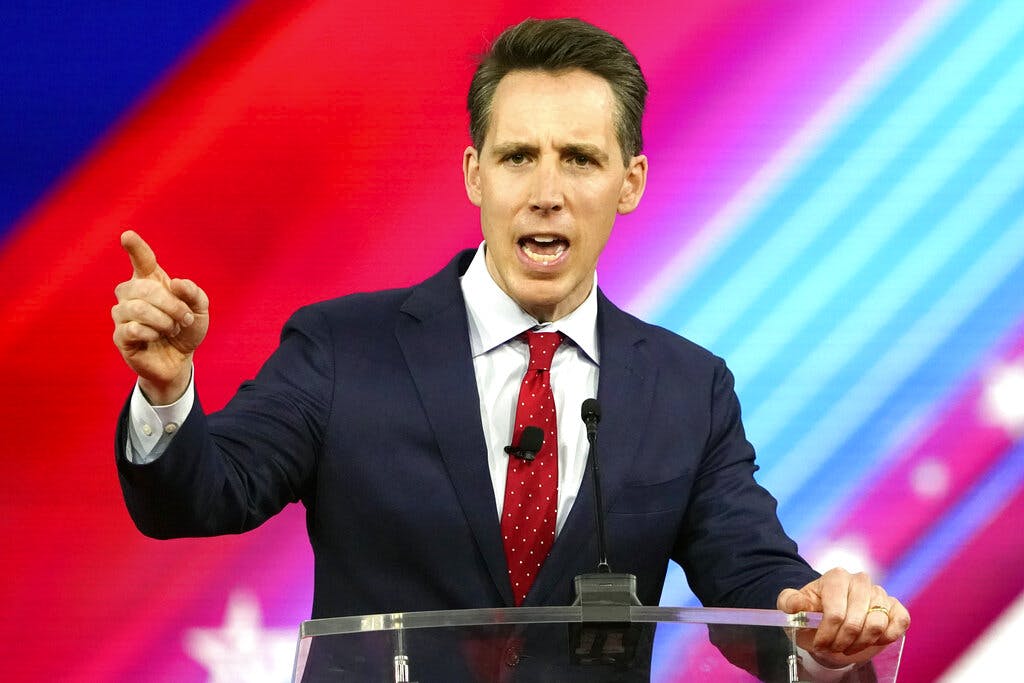Senator Hawley Levels Attack at GOP Over War in Ukraine
‘No to Neoconservativism,’ the solon says, likening Republicans to a Democrat, Woodrow Wilson.

Senator Hawley, the Stanford- and Yale-educated populist whose raised fist in the nation’s capital on January 6, 2021, was widely seen as an endorsement of the chaos of that day, took to the pages of a new journal to accuse fellow Republicans of acting as heirs to a progressive icon, President Wilson.
Mr. Hawley’s essay, “No to Neoconservatism,” offers a view of a party in a process of ongoing ideological churn even as President Biden’s eroding poll numbers illuminate a path back to power. It also underlines how the war in Ukraine has opened up fissures on the right that may yet widen.
In so doing, Mr. Hawley disclosed an emerging effort to set the terms of conservative foreign policy in response to the first land war in Europe in eight decades. At stake is the shape of any Republican foreign policy that might cohere leading up to the presidential election 2024.
Mr. Hawley’s stance puts him at odds with his chamber’s minority leader, Senator McConnell, who in backing billions of dollars in aid for the beleaguered country has noted, “It’s important for the Ukrainians to win, and hopefully not many members of my party will choose to politicize this issue.” He called those opposed to the $40 billion in aid “isolationists.”
Fifty-seven Republicans in the House and 11 in the Senate, including Mr. Hawley, voted against the aid package, with President Trump thundering that “the Democrats are sending another $40 billion to Ukraine, yet America’s parents are struggling to even feed their children.” Mr. Trump was joined in his denunciation by, among others, the Heritage Foundation.
Heritage’s president, Kevin Roberts, insisted that the organization “will not rubber stamp the Swamp’s attempt to use the latest crisis of the moment, especially when it will push our country further into debt, drive up inflation, and reward special interests and even foreign bureaucrats with our citizens’ money.”
Mr. Roberts rejected the “manipulative rhetoric” that would lead down the primrose path to greater involvement in the war. The influential television host Tucker Carlson is also opposing American involvement in the Battle of Ukraine, lambasting Republicans who believe that “protecting Ukraine is way more important than protecting you, than protecting America.”
That Mr. Hawley published his essay in Compact speaks to a shift in the conservative landscape. The journal, which describes itself as “radical,” is helmed by a Marxist, Edwin Alponte; a one-time editor of the religious magazine First Things, Matthew Schmitz; and a conservative journalist, Sohrab Ahmari. They have pledged to battle the “libertine left and a libertarian right.”
Mr. Schmitz told the New York Times: “I’m not much of an interventionist except when it comes to political polemics.” Mr. Hawley appears to have imbibed that sensibility, accusing his fellow Republicans in Congress of bartering “the nationalism of Theodore Roosevelt for the globalism of Woodrow Wilson.”
The life and ideas of the 26th president are subjects that have long preoccupied Mr. Hawley, who in 2008 published a monograph on the Rough Rider titled, “Theodore Roosevelt: Preacher of Righteousness.” TR, of course, rose to glory by emerging in the van of a military expedition that sought to drive a colonial power, Spain, from Cuba.
In Compact, Mr. Hawley castigates “liberal hegemony” in both its “multilateralism” and “nation-building” varieties. He asserts that “the globalist approach has been wrong from the start. And Republicans of all people should know better.” Rather, he urges a return to what he characterizes as a “robust, realistic American nationalism.”
Mr. Hawley argues that “Wilsonian foreign policy” has “nearly bankrupted the country, while siphoning away our national sovereignty and decimating our industrial base.”
In resisting opening the sluices for American money to flow to President Zelensky’s government, Mr. Hawley joins Senator Paul, who explained his vote against more aid to Ukraine by saying that “no matter how sympathetic the cause, my oath of office is to the national security of the United States of America.”

